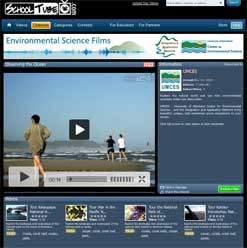As seen on TV....or your computer, or your smart phone
Joanna Woerner · | Environmental Literacy | Science Communication |We've all seen how video-sharing websites have the power to make everyday events such as frolicking kids and frisky kitchens go viral. Well then, we should be able to harness that power to deliver engaging content about items that impact our every day. Items such as climate change, water quality, and public health issues—topics so important, they warrant space on our screens.
The challenge is that these topics don't have the warm and fuzzy factor of frolicking kids and frisky kittens. And, let's face it. Scientists aren't known as the most glamorous or extroverted lot. In addition, distilling scientific concepts into clear concise and accessible points is difficult. At first blush, it seems that online video-sharing and science are not a good match. So, why do we need an online video presence?
In short, because we're losing our audience. Interest in science is lagging. The National Center for Education Statistics reports that the number of bachelor's degrees conferred in biological and biomedical sciences ranked 9th out of 10 fields during 2007. Also, a recent announcement from the Program for International Student Assessment has increased concern about the future of science in America. According to their report, fifteen-year-olds in the United States are ranked 23rd in the world when it comes to science—prompting President Obama to call this a "Sputnik moment" because America is in danger of losing the race for new advances in science. Other fields are out competing us, and we need to promote the next generation of scientists with methods that are engaging and appealing to them. We need to get more science on their computer screens, on their smart phones, and on their minds.

In an effort to do just that, IAN has been working with UMCES to launch a SchoolTube channel featuring environmental science and research. SchoolTube provides teachers and students with a space to post, share, and comment on videos. (Think YouTube without those frolicking kittens or content not suitable for middle and high school students.) The UMCES channel, launching in the new year, will allow students to investigate environmental issues across the country and around the globe. Through videos they can follow scientists as they go in the field, explore unique ecosystems, and hear from people impacted by environmental issues. Not only will students watch, they will be able to participate in video contests and join conversations on our blog. Delivering science concepts in this way will give students a new perspective on science, and hopefully turn a Sputnik moment into an aha! moment.